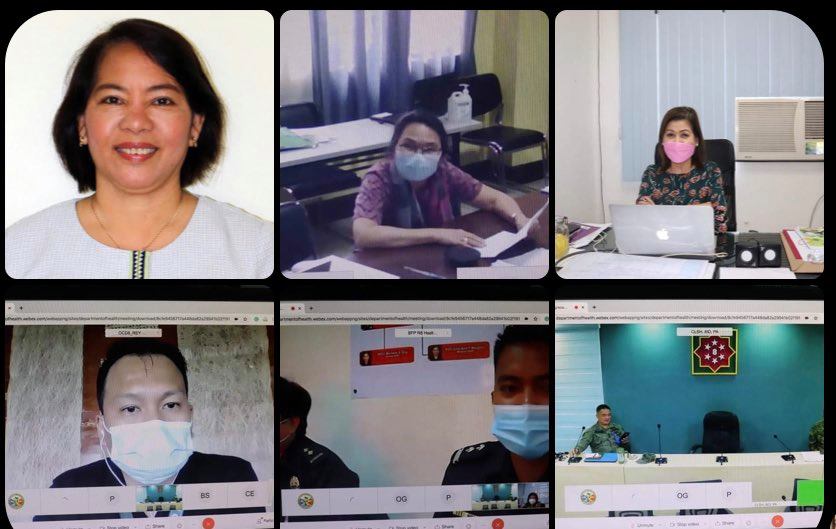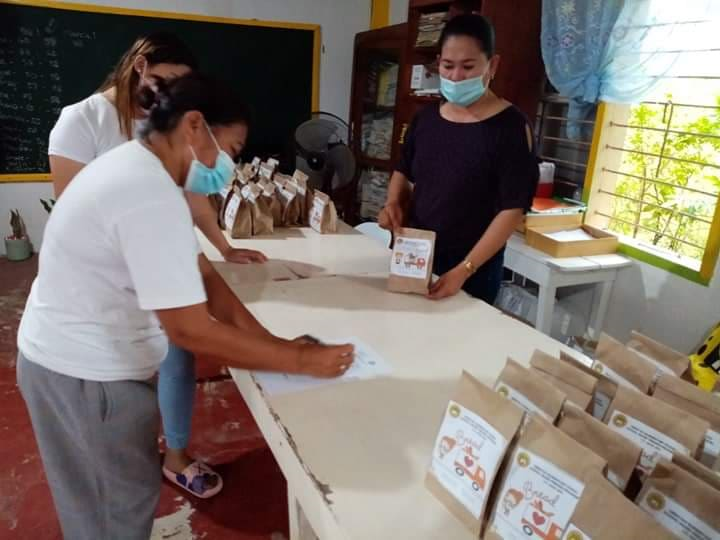Featured Videos
News
- Details
- Written by Aura Shaznay P. Tumulak, VSU
- Category: News
- Hits: 993
Medical frontliners from the Visayas State University were given their first shot of the AstraZeneca COVID-19 vaccine on March 16, 2021, at the old building of the Western Leyte Provincial Hospital (WLPH) in Baybay City.
The first batch included 9 medical frontliners from the University Services for Health, Emergency, and Rescue (USHER) who availed of the most-awaited vaccination program of the national government.
Another batch of USHER staff was sent to the old WLPH building today, March 17, rounding up the total number of vaccinated VSU medical frontliners to 2 medical doctors, 1 dentist, 7 nurses, and 8 other USHER personnel.
VSU resident physicians Dr. Elwin Jay Yu and Dr. Merry Christ'l T. Guinocor along with university dentist Dr. Maria Belen J. Buzon led the USHER staff in this activity.
The second dose of the AstraZeneca COVID-19 vaccine will soon be administered to all of them within two months, according to Dr. Yu.
Dr. Yu, who currently heads USHER, expressed his gratitude to both local and national governments for prioritizing medical frontliners for the national vaccination program.
“When we battled the COVID-19 pandemic in its first year, we were geared with minimum protection by only using face masks, ensuring social distancing, and frequent hand washing. But now that we are vaccinated, we hope that we may be able to serve our constituents with more efficiency and confidence because we know that we are protected,” VSU chief medical officer said.
- Details
- Written by Jessa Pacoma, SSU
- Category: News
- Hits: 1604
CATBALOGAN CITY – Access to health services in the region especially in Samar Island is limited due to unavailability of doctors and hospitals including specialty doctors and specialty clinics. This has become more evident during the Covid-19 outbreak.
Data show that provinces like Samar do not attract new doctors. Thus, the need to produce home-grown doctors who have high likelihood to serve their respective hometowns and the entire province was identified.
Data show that the EV region has only 0.25 doctor per 1,000 population, far from the ideal ratio of 1:1000. Seeing the need for a more aggressive intervention to bridge the gap, Samar State University (SSU) proposed to open a medical school, the Samar Island Institute of Medicine (SIIM).
As a step, SSU conducted a feasibility study in the establishment and operation of SIIM. It was found that the greatest challenge to the planned establishment are funds to operate and a training hospital.
READ FULL ARTICLE REFERENCE HERE . . .
- Details
- Written by Gemma Tabao, PIA 08
- Category: News
- Hits: 1156
TACLOBAN CITY, Mar 4 (PIA) – The COVID-19 vaccines the Eastern Visayans have been dreaming of and wishing for will finally come to reality.
This, as some 7,200 doses of Sinovac vaccine are expected to arrive at the DZR Airport in Tacloban City in the morning of March 5, 2021.
DOH 8 RD Exuperia Sabalberino thru ARD Carmen Garado disclosed during the virtual meeting of the Regional Vaccination Operations Center Teams in the afternoon of March 4 that the vaccines are intended for the health workers of the Eastern Visayas Medical Center, the Schistosomiasis Hospital and the Divine Word Hospital.
All the RVOC Teams have been activated and are all set to do their respective tasks for the arrival and distribution of the vaccines. The teams include the Planning, Logistics, Cold Chain, Surveillance and Communication, Advocacy and Partnership.
It was learned that from the airport, the vaccines will be brought to the Cold Storage Facility of the Department of Health Region 8 where the allocation for EVRMC will be packed ready for delivery at 11:00 o’clock in the morning.
At 2:00 o’clock in the afternoon, the Ceremonial Vaccination will be conducted at the Out Patient Department of EVRMC Cabalawan, where no less that DOH Regional Director Exuperia Sabalberino will vaccinate the EVRMC Chief of Hospital, Dr. Salvador Evardone.
Some 211 health workers of EVRMC are expected to be inoculated on the first day of vaccination. DOH disclosed that some 714 staff of EVRMC have signified their willingness to be inoculated with Sinovac. The hospital is expected to be done with the inoculation within seven days.
The ceremonial vaccination will be attended by the Regional Directors of the Department of Interior and Local Government (DILG), Office of Civil Defense (OCD), Philippine National Police, Armed Forces of the Philippines and the Philippine Information Agency.
DOH also disclosed that both the Schistosomiasis Hospital and the Divine Word Hospital have tentatively scheduled start of vaccination on Monday, March 9, 2021. (PIA8)
- Details
- Written by Rodrigo S. Victoria, PIA 08
- Category: News
- Hits: 1063
NAVAL, Biliran, March 6 (PIA) -- With easing up of the entry and exit protocols in the province in compliance with NIATF Resolution No. 101, Biliran Governor Rogelio J. Espina strongly recommended the strict implementation of the Covid-19 minimum public health standard (MPHS) down to the barangay level.
Governor Espina made the call in a Provincial Inter-Agency Task Force (PIATF) meeting on March 2 with Vice Governor BrigidoCaneja III, Board Members Edgar Igano, Carlos Chan, Allan Paul Tubis and Jerome Arcenal, municipal mayors, municipal health officers (MHOs), municipal local government operations officers (MLGOOs), municipal disaster risk reduction and management officers (MDRRMOs), heads of concerned national government agencies and key members of the PIATF.
“Naoobserbahan ko na medyo hinde mahigpit and implementasyon at pagsunod ng minimum public health standards, lalo na sa mga barangay,” Espina said.
The provincial local chief executive aired his disgust over the report that most of the people in the barangay do not even wear face masks, the very basic protection against Covid-19 virus infection.
READ FULL ARTICLE REFERENCE HERE . . .
- Details
- Written by Dr. Ma. Elsa N. Gerona, DepEd RO 8
- Category: News
- Hits: 6170
Palo, Leyte - The Department of Education (DepEd) Regional Office VIII has continued the implementation of the School-Based Feeding Program (SBFP), noting its relevance in the midst of the COVID-19 pandemic and the challenges it has presented.
Some 185,325 pupils from Kindergarten to Grade 6 nationwide were the beneficiaries of the SBFP’s Nutritious Food Products (NFP) component; and 167,923 pupils provided milk through the SBFP’s milk component.
The SBFP consist of the provision of Nutritious Food Products (NFP) and fresh or sterilized milk with a total fund allocation of P310,864,698.00 for the school year 2020-2021, It aims to address hunger and encourage learners to enroll; contribute to the improvement of their nutritional status; provide nourishment for their growth and development and help boost their immune system, and enhance and improve their health and nutrition values.
The program is in compliance with RA 11037, otherwise known as the Masustansyang Pagkain para sa Batang Pilipino Act signed by Pres. Rodrigo Duterte on June 20, 2018. The law provides for the inclusion of fresh milk or fresh milk-based products in the SBFP as additional component to hot meals. The Bayanihan to Heal as One Act also provides for the augmentation of the SBFP budget for school year 2020.
For the fresh milk component, DepEd has partnered with the Philippine Carabao Center (PCC) and the National Dairy Authority (NDA) along with the support of various cooperatives and small and medium enterprises (SMEs) engaged in dairy business. This is pursuant to the mandates of RA No. 11037 and in accordance with Republic Act No. 8172, otherwise known as the “Philippine Food Fortification Act of 2000”, utilizing, as far as practicable, locally produced milk in order to enhance its nutritional content and, at the same time, help boost livelihood opportunities for local dairy farmers and local dairy industry.
DepEd has also tapped cooperatives and small and medium enterprise (SME) producers of nutritious food products, particularly those assisted and accredited by the Food and Nutrition Research Institute (FNRI) of the Department of Science and Technology (DOST).
For the Milk Feeding Program Component, DepEd, through the BLSS-SHD, sought the assistance of the National Dairy Authority (NDA) and Philippine Carabao Center (PCC) in identifying, gaining access to and dealing with the local dairy farms and/or cooperatives for the sourcing and procurement of fresh milk and sterilized milk, as well as the provision of technical assistance and other services in ensuring the production, processing, packaging, delivery and storage, as well as the safety and hygiene of the fresh milk and sterilized milk that are to be given to the intended beneficiaries. Schools Divisions that are either not covered or are insufficiently covered by the supply map of NDA and PCC were allowed to procure powdered or sterilized milk (Please see DO 37 s. 2020 (Supplemental Guidelines to DepEd Order No. 22 and 23 s. 2020 [Implementation of School-Based Feeding Program ])
As of December 2020, a total of 3613 schools have already implemented the Nutritious Food Products component and Fresh Milk component
With the challenges brought by the pandemic, DepEd adopted and innovated strategies to implement the SBFP following all standard health protocols. Due to deferment of face to face classes, most of the schools directly distributed the food and milk items to the homes of beneficiaries.
Under the new normal and the blended distance learning mode, DepEd intensified its partnership and collaboration with the local government units in the distribution of nutritious food and milk packs directly to the homes of the learners. In areas where parents and/or guardians go to schools to pick-up self-learning modules and/or to submit accomplished worksheets of their children, food and milk ration for one week are also distributed to them.
For SY 2020-2021 the total budget allocation of P310,864,698 was implemented from the month of August, 2020 (see table 1 for fund allocation and regional distribution, SBFP SY 2020-2021). The SBFP SY 2021-2022 has a total budget of P329,908,437.00 targeted for implementation from the month of September 2021 (See Table 2 for fund allocation and regional distribution, SBFP SY 2021-22)
Furthermore, DepEd Order 23, 2020 (Operational Guidelines on the Implementation of the School-Based Feeding Program for the SY 2020-2021) encouraged different strategies and schemes to deliver Nutritious Food Packs (NFP) and milk packs to the children. The following delivery strategies were implemented in the field:
Food commodities served to the beneficiaries are ready-to-eat/easy-to-prepare nutritious food products (fortified or enriched breads or pastries, fruits in season, root crops, and nutria packs) and fresh/sterilized milk. These food items meet one-third (1/3) of the beneficiaries’ daily requirement for energy (calories, protein, vitamin A, and iron) as specified in the Philippine Dietary Reference Intake (PDRI).
This effort is in compliance with the Bayanihan 2 provision of the continued provision of access to free healthy meals to undernourished children regardless of modality of learning through DepEd. (DepEd8)
 |
|
Nutritious Food Products |
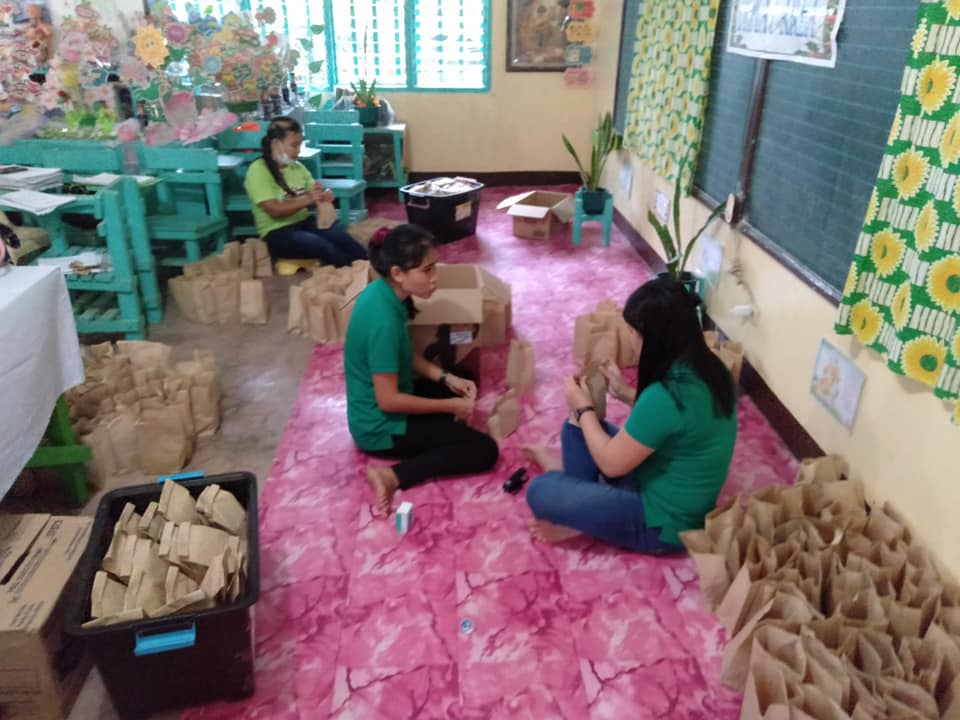 |
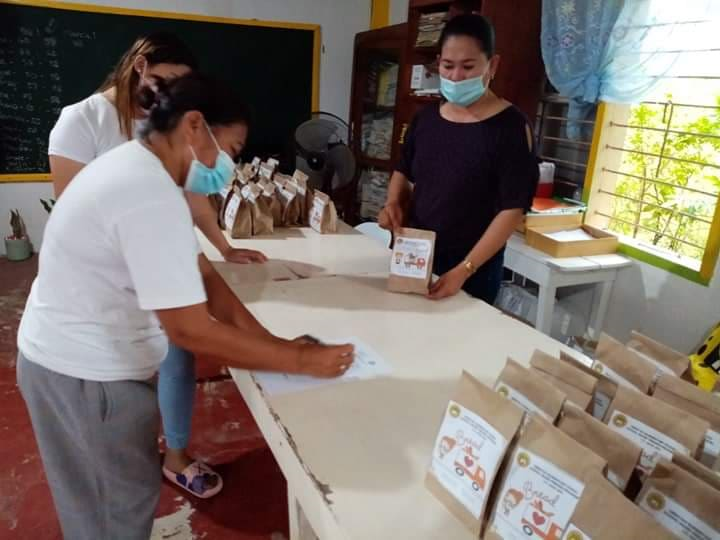 |
|
Distribution of Nutritious Food Packs (NFP) |
|
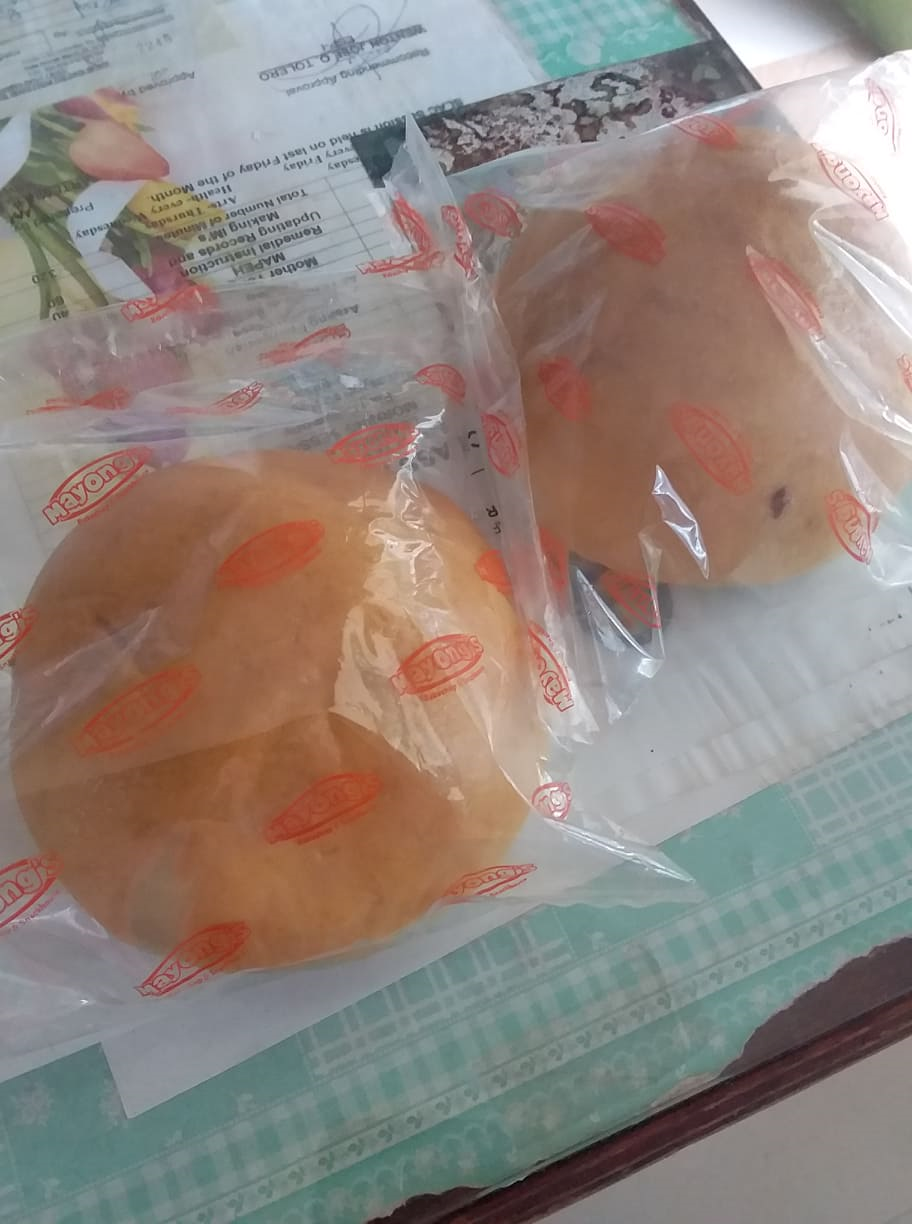 |
|
E-nutribun (DOST-FNRI) |



